
On Monday, Anne Hidalgo, the mayor of Paris, announced that the speed limit in nearly all of the city will fall to 30 kilometres an hour.JB Autissier/Panoramic/Reuters
The mayor of Paris and probable presidential candidate in next year’s French elections, Anne Hidalgo, this week ratcheted up her anti-automobile campaign. Her position, ultimately aimed at making central Paris largely car-free, has earned her kudos among environmentally conscious urbanites, but it could backfire by opening a class and economic war with car-dependent suburbanites.
London, Barcelona, Milan and other big cities in Europe, and some in North America, are watching Ms. Hidalgo’s experiment with fascination. The socialist politician, who was born in Spain, is 62 and is Paris’s first female mayor, is not taking the slowly, slowly approach to ridding Paris’s streets of cars, as London has been doing (London uses a congestion charge to reduce traffic in the city’s centre). She is using a battering ram.
On Monday, she announced that the speed limit in nearly all of Paris will fall to 30 kilometres an hour – a virtual crawl. In Rome, where I live, an enforced speed limit that low would trigger mass protests and get the mayor tossed into the Tiber River. Officially, the new Paris limit is aimed at reducing accidents, pollution and noise, which it will. Unofficially, it is just another way to make driving unbearably annoying.
Making life difficult for drivers has been the centrepiece of Ms. Hidalgo’s policy machine for some years; the COVID-19 pandemic merely accelerated her plans to fill Paris’s streets with bikes and eliminate parking spots.
Paris has already banned heavily polluting diesel cars and turned the Seine River quayside from a congested motorway into a long, skinny waterside park. Last year, cars were banned along the Rue de Rivoli, which stretches across the city centre, passing the Louvre.
Next year, a ban on most vehicle traffic crossing the city centre will come into effect. Paris is also eliminating tens of thousands of parking spots, expanding green areas and installing dedicated bike lanes everywhere.
The rush to net zero could hit the economy as hard as the 1973-74 oil crisis
The government’s 2035 electric vehicle mandate is delusional
The mayor’s goal is to create the 15-minute city, meaning all essential services, from supermarkets and banking to medical clinics and hardware stores, could be reached within 15 minutes by foot or bike. Her plan seems to be working. Other cities in Europe have been inspired by Ms. Hidalgo’s vision and are slowly ridding their streets of cars. Private car ownership, including the ownership of electric cars (which still take up space) in Europe’s biggest cities could be prohibited, but that could take decades – or less.
Ms. Hidalgo’s vision is compelling and divisive in equal measures. Relatively wealthy urban liberals find the idea of a car-free existence attractive, environmentally necessary, even cool; many millennials have no interest in getting a driver’s licence, for theirs is a digital world, not one built on four wheels – cars are yesterday’s technology. Ms. Hidalgo’s easy re-election last year effectively endorsed her urban vision.
But for people who live in the suburbs and rural areas, car-free streets are a threat to their lifestyles and ability to make a living. Those areas have inadequate public transportation or none at all. For them, cars are not a luxury or an affectation; they are the minimum requirement to earn a paycheque.
Suburbanites who require cars to get to city centre jobs are already howling about the nightmarish (to them) car restrictions. They fear politicians who admire Ms. Hidalgo will restrict driving even in non-urban areas, or make it prohibitively expensive through fees and taxes.
And they have political power. The gilets jaunes protests that rocked Paris and other parts of France from 2018 to 2020 began with President Emmanuel Macron’s plans to raise fuel taxes by a few cents a litre. Mr. Macron ultimately backed down on the tax-hiking plan, but not until his popularity had taken a severe blow. His ability to win the 2022 presidential election is far from assured. Voters in the suburbs and rural areas will not forget the class war they believe he ignited.
In the United States and Canada, a Hidalgo-style attack on cars is almost unthinkable, though a few cities, such as New York and San Francisco, are expanding pedestrian-only areas. By European standards, North American cities are public transportation wastelands. Banning cars anywhere would be met with anger, and political careers would come crashing down. Until networks of subways, buses, trams and trains are greatly expanded, the car-free concept is a non-starter.
Still, the general direction is clear. Cities and their near suburbs everywhere will have fewer cars and more public transportation and bikes in the future, and that’s a good thing. Big city politicians will claim their plans are on the sides of the gods, if only for climate change and air quality reasons. Cities clogged with cars produce obscene amounts of greenhouse gases and their air is dirty and often dangerously laden with poisons such as carbon monoxide and sulphur dioxide. Climate action demands that cities become far less carbon intensive.
Ms. Hidalgo’s experiment in Paris is bold, but it may already be close to reaching its limits, that is, it might largely be confined to the city centre. She would have to be exceedingly brave – or witless – to push to extend her car-free vision to the suburbs. She must know it could be political suicide, a battle too far. Her believers will be happy to live in their carless urban paradise, separated from the car-dependent masses who have no choice but to sit in traffic to earn their wages.
Your time is valuable. Have the Top Business Headlines newsletter conveniently delivered to your inbox in the morning or evening. Sign up today.
 Eric Reguly
Eric Reguly